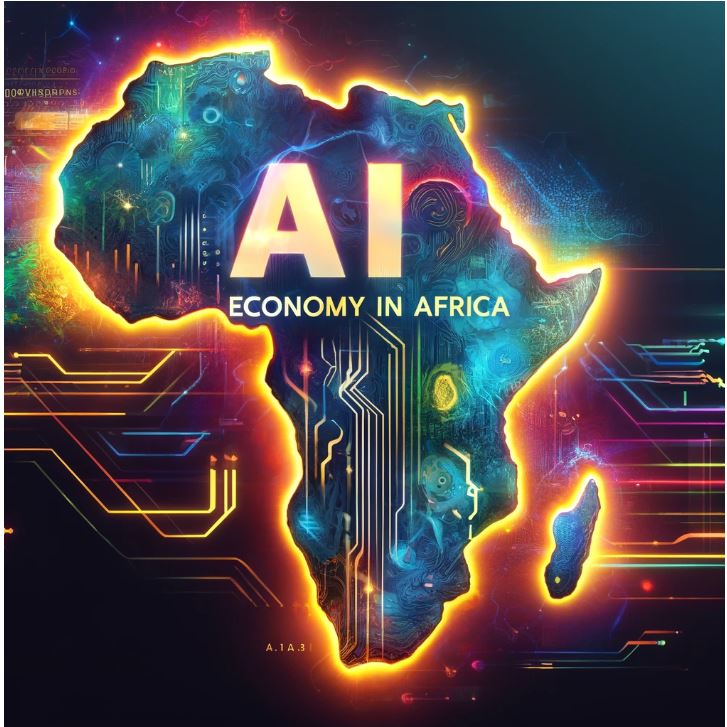AI is quietly reshaping the future of work in Nigeria and across Africa, especially within the technology industry. As smart tools and automation systems become more accessible, the nature of tech-sector jobs is transforming. This story explores how this shift is unfolding, the risks and rewards for Nigerian workers, and the steps being taken to ensure that local talent benefits fully.
Table of Contents

A wave of change in outsourcing and tech services
Reports released in 2025 show that nearly 40 per cent of tasks in Africa’s business process outsourcing (BPO) and IT‑enabled services (ITES) sectors are likely to be automated by the end of this decade. In countries such as Kenya, Nigeria, Ghana and Rwanda, many customer‑service, finance, clerical and entry‑level IT roles are under threat. In Nigeria, junior positions—and particularly roles held by women and young people—are most vulnerable, with women’s tasks on average 10 per cent more likely to be replaced than men’s, according to AP News.
Yet this shift is not purely destructive. With routine tasks automated, new and more skilled roles are emerging—demand for data analysts, cybersecurity experts, AI trainers and systems supervisors is rising. In other words, the landscape is shifting from repetitive chores to oversight, innovation and strategy.
Growth in local startups and funding
In early 2024, Lagos, Abuja, and Port Harcourt boasted over 80 tech startups specialising in intelligent systems and predictive tools—up from about 35 in 2022—having raised more than $120 million in investment. Across Africa, major hubs such as Nairobi, Cape Town, Johannesburg and Cairo are seeing similar expansion, though overall investment in intelligent computing remains modest—Africa accounted for just 1 to 1.5 per cent of global funding in the space in early 2025.
Funding pours in from global players, too. Microsoft has committed to training over one million South Africans in future‑ready skills by 2026, as part of its broader continental initiative, and is building data centres to support the expansion of infrastructure. Meanwhile, local champions such as Elite Global AI, led by Vwakpor Efuetanu, aim to train tens of thousands of Nigerian youths, with a goal of reaching one million by 2030.

Upskilling: the key to inclusion
With transformation comes the urgent need for reskilling. A 2025 SAP report card found that six in ten African firms view intelligent computing capabilities as “extremely important” for future success, but most firms fear delays and stalled innovation due to a lack of available experts. In Nigeria, the government allocated N3 billion ($3.5 million) to research in smart systems and has launched national strategies and digital hubs across all six geopolitical zones to help build capacity.
Community and private sector initiatives are filling gaps. For instance, Microsoft has reached four million Africans with digital skills training over five years, and plans to train another 30 million in the coming years, according to Reuters.com. Training programmes also exist in hubs such as the Ilorin Innovation Hub, which launched in early 2025 to nurture tech founders and developers across fields, including agricultural technology and smart systems.
Moreover, non‑profits like Tech Herfrica focus on digital inclusion for women in rural communities—teaching financial tools, entrepreneurship and literacy in underserved areas, helping narrow the digital divide.
Real‑world use cases in agriculture, health and logistics
Innovative uses of automation systems are already reshaping industries. In Ghana and Ethiopia, farmers use drone‑based platforms to assess crop health and predict yields, improving productivity by up to 60 per cent. Supply‑chain firms across Kenya and Nigeria are using sensor networks and predictive analytics to monitor factory equipment, reducing downtime and maintenance costs by nearly 40 per cent in six months. In retail and logistics, data‑driven route optimisation has slashed delivery times by 60 per cent and fuel use by 25 per cent for e‑commerce firms in Nairobi.
Meanwhile, in healthcare, local startups are developing language‑sensitive diagnostic assistants and clinical intelligence tools that help rural clinics improve accuracy and access. Nigerian firms such as Intron Health and Ethiopian labs like iCog are pioneering natural language platforms that support Amharic, Swahili and other local tongues.
Gender and equality concerns
The shift is not evenly felt. Women in entry‑level outsourcing roles face the highest risk of displacement. One study presented at the first Global Summit on Intelligent Systems in Africa emphasised that tasks by women in the BPO sector are about 10 per cent more likely to be automated than men’s—potentially deepening workplace inequities unless addressed deliberately.
To counter that, experts at the Kigali event called for targeted up‑skilling programmes for women and youth, linking training directly to higher‑value roles such as system design, ethics oversight and supervisory technical positions. Organisations such as Women in Tech Africa and Tech Herfrica are also actively empowering women to take leadership in tech startups and digital literacy ventures.
Ethical and policy frameworks
Alongside capacity building, ethical concerns and regulation cannot be overlooked. Leaders in Nigeria and Rwanda emphasise that systems must reflect African values, avoid bias in hiring or credit scoring, and remain under national sovereignty rather than foreign control. Ghana, Egypt and Mauritius are working on national digital strategies that include principles around fairness, accountability and transparency.
International models advocate treating these technologies like public infrastructure, with public‑private partnerships to build responsible governance frameworks just as early societies treated electricity or transport networks.
Threats ahead: disruption and inequality
While change offers opportunity, risks remain. A former global tech executive recently warned that a 15‑year period of economic and social turbulence may begin as early as 2027—especially for white‑collar professions—unless proactive policies such as universal basic income or rebalancing of wealth are considered.
In Africa, a similar shock could emerge in the outsourcing sector: millions of entry‑level positions may vanish by 2030 unless reskilling and equitable access to new roles are scaled quickly. Connectivity and power remain major bottlenecks too—only around 36‑37 per cent of Africans have reliable internet access, limiting the reach of digital programmes in many regions.
Turning disruption into opportunity
Despite the threats, many leaders frame the evolution as a chance to leapfrog. Nigeria’s startup scene is creating not only jobs but new kinds of work—system operators, local model developers, trainers, ethicists, and data curators. BPO firms are retooling, shifting employees into higher‑skill roles with better pay. Governments are investing in inclusive policy, digital hubs, and research centres to anchor growth nationally.
One case in point is Elite Global AI, which has already trained over 30,000 young Nigerians and plans massive scale by 2030, in collaboration with public and private partners. Similarly, the Ilorin Innovation Hub targets 10,000 new jobs through incubation and skills pipelines.
What every professional can do now
For ambitious tech workers and graduates in Nigeria, the path ahead is clear:
- Reskill early: Invest in data science, risk assessment, systems supervision and local tool development.
- Seek inclusive programmes: Engage with initiatives by Tech Herfrica, Women in Tech Africa, Microsoft’s training tours or public universities’ research labs.
- Aim for roles that can’t be easily automated: Ethics audits, language model training in local tongues, human‑centred services and project management remain more secure.
- Support local solutions: Enthuse in home‑grown startups that solve problems for farmers, learners, patients, and SMEs.

The bigger picture: reshaping Africa’s economy
The transition in tech jobs represents more than just workforce change. Projections show Africa’s BPO sector alone could reach $35 billion in value by 2028, if capacity building keeps pace with automation shifts. Globally, intelligent computing might add trillions to GDP if deployed equitably, with African economies potentially contributing a meaningful slice of that growth alongside other developing markets.
When local firms, governments and educators align to build inclusive systems—promoting fairness, training women and youth, supporting entrepreneurs—the disruption becomes a catalyst for innovation and opportunity.
Conclusion
Africa is witnessing a seismic shift in tech‑sector employment. Up to 40 per cent of outsourcing tasks could be automated by 2030—but with proactive reskilling, inclusive programmes and local innovation, new, more valuable roles are emerging. Nigeria stands at the forefront of this transformation, with public, private and non‑profit actors working to build a tech workforce ready for the future.








































